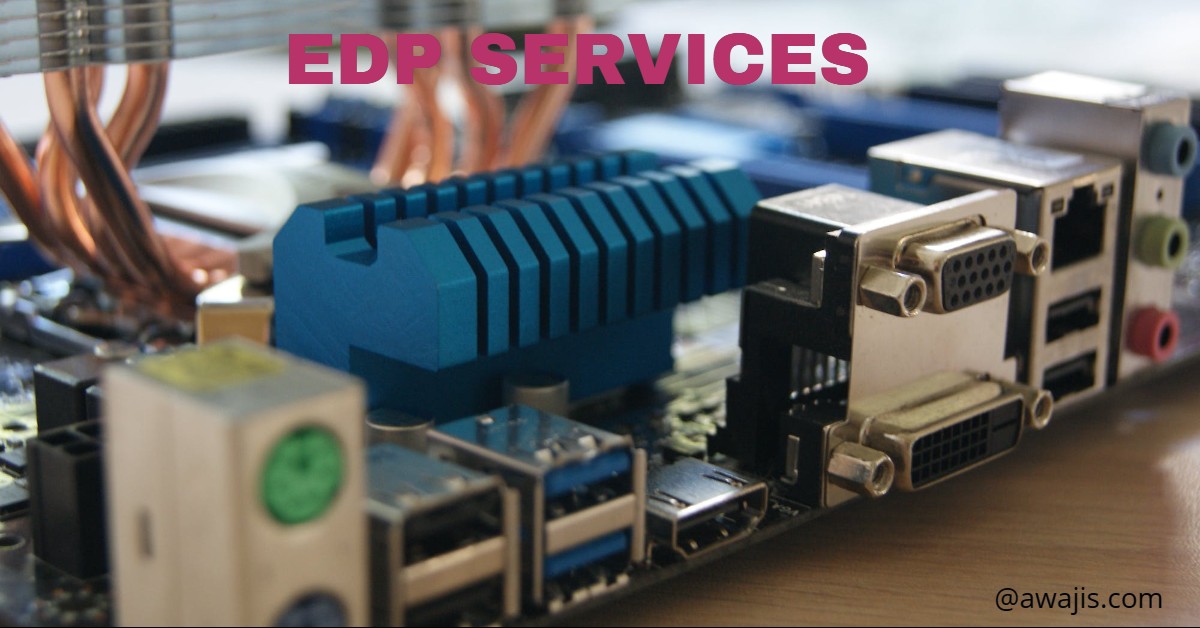EDP Services
The idea of electronic data processing (EDP) developed from DP. The period when this term first appeared was when the majority of data sent to a computer was done via physical means, such as punch cards.
What is EDP?
Data collection by electronic means, such as computers, servers, or calculators, is known as electronic data processing (EDP). An alternative name for computerized data processing. Data analysis is also a part of this process, as is capturing the results in a (human) readable format.
EDP Services

Every day, the amount of data created in the 21st century increases at a rate that has never been seen before. Some projections put the size of the global datasphere at several hundred zettabytes (1 ZB = 1 trillion gigabytes) within the next several years. The widespread adoption of digital technologies and the advent of new ones partly cause this data explosion.
Data is often referred to as “new oil” because of its vast possibilities for growth and development, particularly within institutions. Yet businesses must have a method to efficiently collect and extract useful information from their mountain of data. Manual methods are not up to managing such massive data sets, but EDP is.
Electronic Data Processing (EDP) facilitates a timelier and more precise data processing technique, analytics, and result display. Businesses can benefit from EDP systems because they automate the collection of valuable data about their industry, market, consumers, and competitors.
According to definitions used by the industry, the EDP Services sub-sector is part of the broader technology sector. Many firms with commercial operations in the EDP Services sector have their shares listed on the biggest equities exchanges in the United States, making it convenient for investors to trade and invest in such stocks.
List of a few EDP services
-
RealNetworks, Inc.
-
Workday
-
RingCentral
-
Zynga, Inc
-
Zendesk
-
Five9
-
Automatic Data Processing
-
Acxiom
-
Glatek
-
Monotype Imaging
-
Carbonite
-
Proofpoint, Inc
-
Shutterstock
-
NET2GRID
-
Amdocs Limited
These are just but a few of the EDP services companies
About EDP services
Our company, EDP Services, is a leader in financial technology, providing cutting-edge services and solutions. EDP Services works with its patrons to improve their operations and productivity to achieve this goal. With strong financial sector and business process knowledge, vast industry resources and an established track record spanning over a decade, EDP Services can mobilize the relevant people, skills, and technologies to assist client increase their performance drastically. The Areas in Which We Excel Are:
- Financial Management System
- Professional Services for Core Banking System
- Customized Development
- ERP Solutions
Over the past 20 years, EDP has built a reputation for providing unrivalled service and support to its 100+ satisfied customers. We are focusing on the Finance/Banking/Capital industry, having expert resources with strong domain knowledge and over 100 man-years of top-level experience and exposure.
Advantages of EDP
Faster processing and analysis of massive amounts of data is the primary benefit of EDP systems. Because they eliminate the need for traditional document management practices like filing cabinets, printing, and courier services, EDP solutions also help lower the overall cost of managing and storing paper documents.
Easy document search and the streamlining of corporate processes are two areas where many EDP technologies excel. All parties involved in a project can see where the information they need stands in real time.
With the help of EDP tools, businesses may make more informed decisions with less work and fewer instances of inaccurate or repetitive information. Lastly, some EDP systems can conveniently store massive amounts of data for later analysis and presentation.
Electronic data processing steps or methods
- Data collection
Data in an EDP system could come from a variety of different places. If we want to get the most out of this system, we need reliable information. Modern EDP systems can efficiently retrieve vast amounts of information from large data storage facilities like data lakes and warehouses.
- Data preparation and conversion
An EDP system filters out erroneous or irrelevant information that could compromise the quality of the final product. If the inputted data is not in the proper format, the system will convert it before processing.
- Processing of data
Futuristic EDP systems may use machine learning algorithms to analyze and understand information. Data processing in older systems may be handled differently and less efficiently. The specific processing approach typically differs based on the nature of the data, its origin, and its intended application.
- Data output
The data is then transformed into visual and textual formats that humans can easily understand. Humans can then analyze the converted data without the need for technical training.
- Data storage
The final phase of EDP is data storage. Information after processing and conversion is written to the media for later use. The correct storage — and often encryption — of data is often required to maintain compliance in many sectors.
EDP Applications

Electronic data processing is widely used in supply chain logistics and stock monitoring. Supply chains in modern retail and e-commerce are notoriously lengthy and complicated due to the sheer number of involved parties and the sheer volume of data collected at every stage.
Accurate data capture is essential to guarantee timely order fulfilment and a steady flow of sales leads. EDP technologies facilitate the seamless flow of data to streamline supply chain operations and smooth interactions between the numerous moving sections of the chain.
The following are additional fields of endeavour where electronic data processing finds widespread use:
- Telecommunications and electronics
- Education
- Healthcare, pharmaceuticals and clinical research
- Hospitality and tourism
- Financial services
- Law and order
- Natural sciences, e.g., palaeontology and geology
Elements of electronic data processing
EDP systems are made up of four major components.
Hardware
All physical components of the EDP system, including devices and peripherals, are referred to as hardware. The following are the most common digital devices used in EDP:
End-user computing devices that can record data and allow data entry, such as laptop computers, desktop PCs, and cell phones;
A central server is required to facilitate data processing and analysis, as well as audio and video devices for data recording in multimedia format.
Furthermore, EDP systems may incorporate the following:
- Scanners are used for digitizing paper-based data.
- Product pricing is captured via barcode scanners and point-of-sale devices. Billing information
- Medical gadgets and sensors collect patients’ data to diagnose and treat them.
Computer software
Software in EDP makes the hardware work and guarantees that the intended result is delivered. There are different types of EDP software available for a variety of applications and business purposes, including the following:
- Data entry
- Bookkeeping and accounting
- Analytics
- Time management and scheduling
- Inventory control
Methodologies
EDP includes procedures or actions for data gathering, aggregation, conversion, sorting, analysis, and reporting in addition to hardware and software (see below).
Employees
Personnel is the final component of EDP. EDP technologies replace manual work with automation to reduce human involvement, but people need to manage the systems and apply the insights to business decision-making.

EDP and Future Trends
AI and Automation
AI and automation are revolutionizing electronic data processing (EDP) activities in numerous ways.
Here are some instances:
- Automation of tasks: AI and automation are now being used in many electronic data processing activities, from data storage to processing. This ensures human workers concentrate on better strategic and creative projects.
- Better efficiency: AI and automation are assisting businesses to enhance their efficiency by streamlining tasks and lowering errors. This will result in reduced costs and enhanced productivity.
Data Privacy and Security
Data privacy will be crucial in the future of electronic data processing. This revolves around strategic activities carried out to protect data and its availability. There has been a rise in conversations about the integrity of sensitive data and securing businesses that collect data.
In the future, electronic data processing will integrate technologies that will help prevent data loss and corruption. The goal will be to guarantee the accessibility and reliability of data.
Related:
Commercial Loan Truerate Services